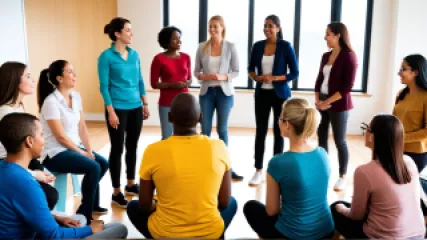How to Prepare for a Social Skills Workshop
How to Prepare for a Social Skills WorkshopWelcome to our comprehensive guide on how to prepare for a social skills workshop. Whether you're attending one for personal growth or professional development, this article will provide you with valuable insights and tips to make the most out of your experience. Social skills training is an excellent way to enhance your interpersonal abilities, boost your confidence, and navigate various social situations with ease. So, let's dive in and discover how you can effectively prepare for a social skills workshop.
1. Understand the Purpose
Before attending a social skills workshop, it's essential to understand the purpose behind it. Take some time to research and familiarize yourself with the goals and objectives of the workshop. Is it focused on improving communication skills, building rapport, or enhancing networking abilities? By gaining clarity on the workshop's purpose, you can align your expectations and set specific goals for yourself.
2. Set Personal Objectives
Once you understand the purpose of the workshop, it's crucial to set personal objectives. Reflect on your current social skills and identify areas where you would like to improve. Do you struggle with public speaking, maintaining eye contact, or initiating conversations? By setting clear objectives, you can actively work towards addressing these challenges during the workshop.
3. Research the Workshop Content
Take some time to research the content that will be covered during the social skills workshop. Look for any pre-workshop materials or readings provided by the organizers. Familiarize yourself with the topics, exercises, and techniques that will be discussed. This will help you come prepared with relevant questions and enable you to actively engage in the discussions.
4. Practice Active Listening
Active listening is a fundamental skill in any social interaction. To prepare for the workshop, practice active listening in your everyday conversations. Focus on fully understanding what others are saying, ask follow-up questions, and provide thoughtful responses. By honing your active listening skills, you'll be better equipped to actively participate and contribute during the workshop.
5. Embrace Open-mindedness
Approach the social skills workshop with an open mind. Be willing to learn and explore new ideas and perspectives. Remember that everyone attending the workshop is on their own journey of growth, just like you. Embracing open-mindedness will allow you to absorb new information, challenge your existing beliefs, and broaden your understanding of effective social skills.
6. Practice Self-reflection
Self-reflection is a powerful tool for personal development. Take some time to reflect on your own social interactions and behaviors. Consider situations where you felt confident and those where you faced challenges. Analyze your strengths and areas for improvement. This self-awareness will help you actively engage in the workshop exercises and discussions.
7. Prepare Questions
Prepare a list of questions you would like to ask during the workshop. These can be related to specific social situations, challenges you've faced, or strategies for improvement. Having prepared questions will ensure that you make the most of the workshop by addressing your individual concerns and receiving valuable insights from the facilitators and fellow participants.
8. Practice Mindfulness
Mindfulness is a practice that cultivates present-moment awareness. Engaging in mindfulness exercises before the workshop can help you stay focused, attentive, and receptive during the sessions. Try incorporating activities like meditation, deep breathing, or yoga into your routine to enhance your ability to be fully present during the workshop.
9. Build a Supportive Network
Consider reaching out to other participants before the workshop. Building a supportive network of like-minded individuals can provide you with an opportunity to share experiences, discuss challenges, and practice social skills together. Connecting with others who share similar goals will not only enrich your workshop experience but also create a supportive community for continued growth.
10. Keep an Open Mind After the Workshop
Finally, remember that the learning doesn't stop once the workshop concludes. Social skills development is an ongoing process that requires continuous practice and refinement. Be open to applying the knowledge and techniques you learned during the workshop in your everyday life. With consistent effort and dedication, you can continue to improve your social skills and build meaningful connections.
Now that you have a comprehensive guide on how to prepare for a social skills workshop, it's time to take action. Remember, the key is to approach the workshop with a growth mindset, set clear objectives, and actively engage in the learning process. By following these steps, you'll be well-prepared to make the most out of your social skills training experience. Good luck!






